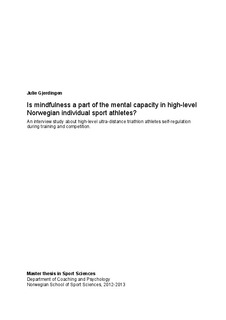| dc.description.abstract | The difference between success and failure has become increasingly
smaller in sport (Birrer & Morgan, 2010). While sport psychology relied mainly on
“second wave” cognitive-behavioural interventions for the last four decades,, a new
direction has recently been suggested. A “third wave” approach in sport psychology,
including mindfulness, assumes that ideal performance is a state that is not based on
self-control or change in behaviour, but rather a state that arises from recognition and
acceptance of thoughts, emotions and bodily sensations (Gardner & Moore, 2004).
Experiencing being in the moment, here and now, free from any form for evaluation.
Aim of the study: This research project investigated how elite-level triathletes use
aspects of mindfulness in training and competition (e.g. Thienot et al., 2012b) such as
meta-awareness, acceptance and refocusing strategies. Mindfulness in sports is a recent
field and the contemporary tenets need to be tested for validity. This study assessed
whether a mindfulness approach is in line with athletes’ practice, and tested how
suitable a mindfulness definition may be suitable for sport. | no_NO |
